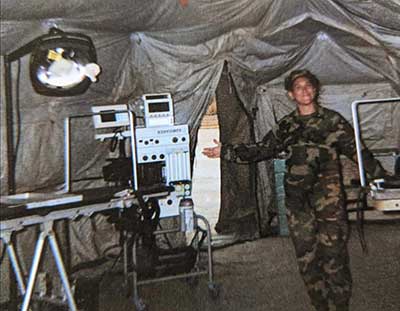- Home
- The Stitch
- The Stitch Article
Why I Became (and Stayed) a Perioperative Nurse
By: Tracey Kunkel, BSN, RN, CNOR
Published: 7/25/2024
The why behind becoming a perioperative nurse was a long and winding road for me. Before I even thought about becoming a nurse, I worked in an OR as an orderly during a summer semester of college. After college, I pursued a career in the Navy, but my first experience in the medical field always stuck with me, so years later, I decided to attend nursing school to become a Navy nurse.
Since I was in the military, the Navy decided where I would work after I graduated. For the first 3 years, I did a combination of nursery, the NICU, mother-baby/post-partum, and labor and delivery (L&D). One night shift, when I oversaw triage for L&D, I was running from patient to patient. A perioperative nurse was there to take a patient back for a C-section and asked, “Have you thought about working in the OR? Only one patient at a time….” This was a lightbulb moment for me, and I agreed to try the OR. The perioperative nurse made sure to transfer me to the same-day surgery unit or APU (ambulatory procedures unit) to convince me. One surgeon even had me scrub in to observe and hold a sponge. Their efforts succeeded, and I applied to the Navy’s OR school and became a perioperative nurse.

(Above) Lieutenant Tracey Kunkel in the operating room, US Navy, Nurse Corps (LT, USN, NC), deployment training at Camp Pendleton Marine Corps base. (Top right) Lieutenant Commander Kunkel (LCDR, US Navy Nurse Corps), USNS Mercy 2006, humanitarian assistance deployment to Indonesia.
Why I Stayed
Why do I stay in the OR? Over the years, although I worked in the OR, I have been pulled to help or work in other areas. I worked in a surgeon’s office part-time for a short while. I did the preop teaching and planning with his patients. I came to the OR and was the circulating nurse. I also did their postop care and teaching back in the office. I could always see the relief in the patients’ eyes when I showed up in preop to take them to the OR. They recognized me and trusted me. Afterward, they were always grateful that I was there for them. This is just one of the ways that my why has been reinforced. It reminded me how much patients and their families need us to comfort them and to act as their advocates.
I love the unique teamwork in the OR. I am passionate about being able to work with team members and grow with them. As a perioperative nurse, I continue to learn from my colleagues. Although I have been a perioperative nurse for many years, I continue to learn new procedures and different methods of doing things. I am in awe of the new surgical procedures and technologies that are continuously being developed and that enhance both the life expectancy and quality of life for our patients.
I love being able to give my full attention to one patient. As a perioperative nurse, I advocate for patients and their families, particularly when patients are at their most vulnerable. Additionally, I have been able to assist my patients and their families and provide them with emotional support. These are just some of my whys.
Being on the Other Side
I have seen things from the perspective of the patients and their loved ones. When my family members need surgery, being on the other side and sitting in the waiting room is exceedingly difficult. Sometimes, if you work in the OR, you can select who cares for your family member. Other times, they have surgery somewhere where you do not influence staffing. During those cases, I have been reminded that this is how my patients and their families experience surgery: without knowing anyone. I always remind myself that I should care for patients as if they were my sister, brother, mother, or daughter undergoing surgery. It is important to remember that each patient is someone’s family member and should be treated as you would want your family member treated.

